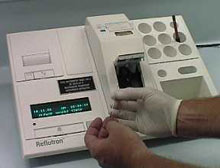The glucose tolerance test, also called the glucose challenge test, determines how quickly glucose is cleared from the blood. After fasting, the test involves taking an amount of glucose and monitoring the changes in blood sugar for the following two hours. The test is usually conducted as a test for diabetes.
equipment required: blood glucose analyzer, blood collection apparatus, glucose, scales.
procedure: The test is performed immediately following a fast of between 8-16 hours. A fasting blood glucose measurement is performed immediately prior to the test. If this level is greater than 7.0 mmol/L, the test is usually not performed as this level signifies diabetes mellitus. The patient is then given a glucose solution to drink. Adults are given 75 grams of glucose, children are given an amount dependent on their weight: 1.75 g/kg body weight (up to 75 grams maximum). The patient is instructed to rest, then another blood glucose measurement is taken after 2 hours.
results:
| Rating | Fasting | 2 Hour |
|---|---|---|
| Normal | < 5.5 mmol/L | < 7.8 mmol/L |
| Impaired glucose tolerance | < 5.5 mmol/L | 7.8 - 11.0 mmol/L |
| Impaired fasting glycemia | 5.5 - 6.9 mmol/L | < 7.8 mmol/L |
| Diabetes mellitus: | > 7.0 mmol/L | > 11.1 mmol/L |
 contraindications: the GTT should not be done if the patient is ill, is known to have diabetes mellitus, or has symptoms suggestive of diabetes mellitus (e.g. fasting plasma glucose >7.0 mmol/L or random plasma glucose >11.1 mmol/L.
contraindications: the GTT should not be done if the patient is ill, is known to have diabetes mellitus, or has symptoms suggestive of diabetes mellitus (e.g. fasting plasma glucose >7.0 mmol/L or random plasma glucose >11.1 mmol/L.
Related Pages
- Blood Glucose Testing
- Blood testing procedures
- Other Health Related Tests
- Article: Are you at Risk of Contracting Diabetes?
- Article: How To Prevent Type 2 Diabetes
- About diabetes
- Health Tests for Athletes


 Current Events
Current Events